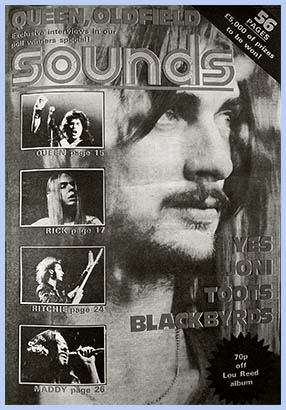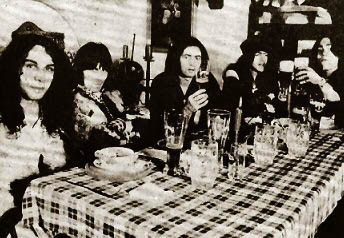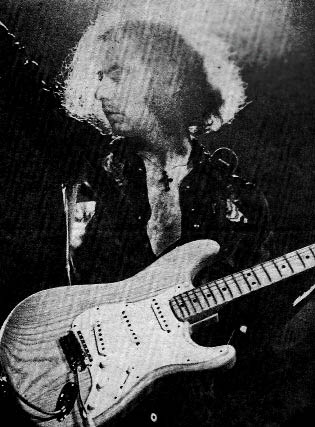|
Ritchie Blackmore The view from the top of the Rainbow The Blackmore proclamation as read to Geoff Barton 'It is not the critic who counts, not the man who points out how the strong man stumbles, or whether the doer of deeds could have done better. The credit belongs to the man who is actually in the arena ... who spends himself in, the worthy cause ... and whose place shall never know neither victory nor defeat.'  IT'S BEEN a matter of the merest months, but even now the original publicity shots are stacked in useless piles; already your just slightly scratched, only marginally over played album is outdated.
IT'S BEEN a matter of the merest months, but even now the original publicity shots are stacked in useless piles; already your just slightly scratched, only marginally over played album is outdated.There's been a second shower and the fading, at once suddenly jaded Rainbow has heen replaced by another. One with newer, and probably brighter colours than before. Gary, you see, has made way for Cozy. Craig's place has gone to Jimmy. And for Mickey Lee, now read Tony. Once again Ritchie Blackmore has moved on. But it was callous, the way he kicked out most of Elf to further his own ends. Well, wasn't it? "The first album was recorded very quickly." Ritchie relates. "I'd written some songs with Ronnie Dio, Elf's vocalist, and the rest of his group were available for recording. We tried to get together as a band, we really did, but certain things were found to be lacking." Maybe callous is too strong a word. Intolerant or unfeeling would have been better terms to use. Or perhaps none of them at all. Still, it's true to say that to the average punter, the typical Deep Purple - Blackmore - Rainbow fan, however, the adjectives probably do ring true. It does seem, on the surface and without a degree of insight, that Ritchie Blackmore has conducted his solo career rather ruthlessly: leaving Purple to join Elf, as some inaccurate reports would have it, recording an album as he did, and then, in the wake of its commercial success, ousting all the band's personnel save one and drafting in replacements of his own. Whatever your opinions on that score, I feel sure that you'll renounce them soon enough. The new Rainbow, comprising carefully selected musicians, pulses with a seemingly boundless enthusiasm and almost fanatical verve, something that you rarely find in bands these days. After being in the company of the whole outfit for a few short hours, you can't help but realise that Blackmore, even with all his wheelings and dealings, his acquisitions of new members, is infinitely right. And it's not just an initial freshness and excitement that the three of them feel, being in the hand. It's got permanence. Urchin Munich's snowbound Arabella hotel: conveniently sited above Musicland studios, fast becoming a veritable European recording Mecca, despite its comparative infancy. Rainbow are in Germany rehearsing, preparing to lay down their second album in a few days time. But meanwhile, we're all packed tight in Blackmore's room. Medieval music of his own choosing, full of lute, harpsichord and suchlike, is filtering through modest speakers, and we talk about the past, present and future. I wondered, nonetheless, if Ronnie Dio felt saddened about the shall I say, disbanding of Elf - which was, ostensibly, his band - to form Rainbow.  "Yes, I do. A little." he admits, tonight looking more of an urchin than an Elf. "Three of us, myself, Mickey Lee Soule the keyboard player and especially Gary Driscoll the drummer, had been together for years.
"Yes, I do. A little." he admits, tonight looking more of an urchin than an Elf. "Three of us, myself, Mickey Lee Soule the keyboard player and especially Gary Driscoll the drummer, had been together for years."We knew each other so well that we dearly wanted to rise with Ritchie together. We fought the odds and we thought, 'yeah, we're all going to do it'. "It was only when I saw myself progressing and the rest of them standing still, then gradually falling off by the wayside, that I realised that Elf had finished. It was a problem. It was sad. It was like cutting off a part of myself as opposed to just breaking up a band. "But the joy of it was knowing that everything was going to be better for me - you have to think of yourself at some point. That offset the sadness a lot." And certainly, Rainbow's remoulding puts paid once and for all to the aforementioned rumours that Ritchie Blackmore had left Rainbow to join Elf. "That was silly," says Blackmore in his customary, if initially disturbing, monotone. "That was for silly people. In every interview I did at the time I made the point that I had not become a member of the band - but it didn't seem to make the slightest difference!" "It would have been obvious to anyone. who had heard Elf's music and had then listened to Rainbow that there was a vast difference," interjects Ronnie, anxious to make his point. "Elfs style was firstly moulded around Ritchie's ideas and, secondly, my own. Ritchie and I had written some songs and we had a definite idea as to what our band would be like. "Really, I think that you have to consider the rest of Elf very fortunate in that Ritchie actually said, 'all right, I want to use you on this album I'm going to do. I don't want you to join, but I'll use you because I think you're capable of doing it'. Direction "But recording is an entirely different thing to rehearsing, gigging and banging out songs. So it was that the various members of Elf left, over a period of time. It wasn't anything to do with a lack of talent, it was just a lack of talent in the right direction. What I'm trying to say is Ritchie formed the band Rainbow, gave the others a chance, but then, being true to himself and true to the music he believes in, found out that it didn't work."  First to leave was the bassist, then, soon after, the keyboard player and drummer. Replacements are Jimmy Bain, Tony Carey and Cozy Powell respectively. Cozy's tale was chronicled with fair accuracy in a recent SOUNDS interview: a one-time Jeff Beck sideman, late of Bedlam and Hammer, he was about to leave the musicbiz for motor racing when he got a call from Blackmore, who was in the States, asking him to come over. Cozy was the thirteenth drummer Rainbow auditioned. But they got lucky.
First to leave was the bassist, then, soon after, the keyboard player and drummer. Replacements are Jimmy Bain, Tony Carey and Cozy Powell respectively. Cozy's tale was chronicled with fair accuracy in a recent SOUNDS interview: a one-time Jeff Beck sideman, late of Bedlam and Hammer, he was about to leave the musicbiz for motor racing when he got a call from Blackmore, who was in the States, asking him to come over. Cozy was the thirteenth drummer Rainbow auditioned. But they got lucky.Neither Bain's nor Carey's stories have been documented so far, however. Jimmy Bain is Scottish and, true to the saying, is proud of it, even though his accent is already becoming tinged with an inevitable LA influence. Long haired, slight, friendly and an ex-Harlot. "Ronnie saw me playing with Harlot at the Marquee when he and Ritchie were over in Britain doing interviews, just before the release of the first album. He sort of approached me, we drank 18 pints of Stella Artois, I went along with him to jam with Ritchie, managed to get my guitar out of the case, never actually played a note ... but I Found myself in the band!" Were Harlot near to splitting up, when you were approached to join Rainbow? "No, actually the band were doing quite well. In fact, we got more offers after people heard that Ritchie was interested in me than we ever did at any time in the past. People who totally ignored us before began trying to sign us up. They were all too ready to jump in when there was a name involved, but previously, when we were struggling, they just didn't care. That wasn't for me, it was too late. The band had been together for 18 months and nothing had happened during that time - I decided to move on and further my career. "So I sat around with Ronnie and Ritchie and found them to be so totally compatible, totally professional people, in their attitudes, in everything. It worked" Tony Carey, meanwhile, is a 22-year-old, half Cherokee American Indian. Classically trained, he started playing piano when he was 12, and majored in string bass at college. He's great. Jimmy Bain came across him when he, Ritchie, Ronnie and by that time Cozy were back over in he States. "I was with a kind of Country and Western band, signed to ABC Dunhill, called Blessings at the time," Tony recalls. "Jimmy bumped into me and said, 'Hey, want to have a blow?' I say, 'Sure', "So I go down and there's all his gross equipment and this big, huge soundstage. I took to some keyboards and played. It was the loudest thing I ever heard. I loved it. Oh, I loved it." His voice is laced with exhilaration as he's reliving that exact moment. "I played for about half an hour, then Ritchie says, 'OK, let's jam'. So he brings in Cozy, this monster, and asks, 'can you play this?' - ratatataratatata! he goes. I guess I kept up. That's the last thing I remember," he admits, looking at me with suitably glazed eyes. Now ... back to the regularly scheduled interview. My first conversation with Ritchie Blackmore was very much a feeling-of-the-way affair. I'd heard of his temperament, his mean and moody, 'man in black' image - true or not, who hasn't? - and, although the victim of the inevitable practical jokes, I got through relatively unscathed. Second time around was more comfortable. Slightly. "I was very pleased with the reaction to the first album," Blackmore says, genuinely, "very pleased. My only criticism was that it could have had a little more zest. "A lot of critics, I seem to recall, complained that it sounded like just another Deep Purple LP. Well, I wrote most of Purple's music, so it's obviously going to sound similar. I'm not going to start to play the classics or take up the lute," he cocks an ear towards the continuing time-worn background recording, "just because I've started a new band and the critics want me to. The way I play is hard and heavy and I can't alter that. "I wrote something about critics once." He stands up to rustle in a nearby briefcase and finally discovers what looks like a piece of scrap paper. On it, however, he has painstakingly written some sort of ode or proclamation. He reads it out loud and, curiously, it fits in with the quietly playing music, even though the subject matter appears to belong much to the present and is obviously close to his heart. 'It is not the critic who counts,' it runs, 'not the man who points out how the strong man stumbles, or whether the doer of deeds could have done better. The credit belongs to the man who is actually in the arena ... who spends himself in the worthy cause ... and (whose) place shall never know neither victory nor defeat.' Think on't. To less enigmatic matters, I wondered how Ritchie felt about Deep Purple at present. Are they just clinging to the name and past glories? Or have they still something valid to offer?  The answer was predictably evasive: "Ahhh ... I don't know. I don't take much notice of what they're doing. I only listened to their new album once and, I suppose, they're doing what I expected them to do. They're just ... awww, it's not fair. I can't be objective. Maybe in four or five years I'll be able to. I wish them well, and that's it."
The answer was predictably evasive: "Ahhh ... I don't know. I don't take much notice of what they're doing. I only listened to their new album once and, I suppose, they're doing what I expected them to do. They're just ... awww, it's not fair. I can't be objective. Maybe in four or five years I'll be able to. I wish them well, and that's it.""Donny and Marie said it all, didn't they?" jibes Jimmy Bain. Rainbow's first LP was, naturally, a formative effort, and while being unmistakeably Blackmore, had it share of rough edges. For the next album, which will be released in April, the band are striving for a more striking, more aggressive sound. "All the songs on the first album were written at my own house," Blackmore says, "then I put them down on tape and said to the band, 'play this'. But now, with the new line-up, it's every man for himself. We're writing, funnily enough, in the same way that Purple used to write - if they used to write at all - during rehearsals and in the studio. "It's very hard, very much like early Purple in 'In Rock' days. There are some involved tracks, but I don't think we ever lose sight of our original objectives. We're not playing to musicians, we're playing to the people," he concludes, not sounding cliched, surprisingly enough. Rainbow's long-awaited British debut tour won't be until August, when about ten dates are scheduled. There are plans to gig in the States two months after the album is released and then to play Europe. Blackmore hopes to bring the band's entire stage show over to Britain: "We've taken a lot of trouble with our lighting," he reveals, "we use as a backdrop the picture of the guitar-cum-castle, as on he album cover. We have a rainbow, as well." A rainbow? "Yeah. It was made in New York, took four months to make and takes six hours to erect. It's run by a digital computer. It's a vast thing, it changes colours like a real rainbow and eats up electricity like nobody's business. We may even have to take our own generator, when we play Britain." As a final question, I asked Ritchie how he felt about the fact that both he and the band have figured strongly in the SOUNDS poll. "Dynamic. I think that's the right word. I haven't thought too much about the people over the past few years, I've just been content to play the sort of music I like to hear. But obviously, others want to hear it too. It's really nice to know that they're listening." And he means it, kids. © Geoff Barton, Sounds, 31 January 1976 |